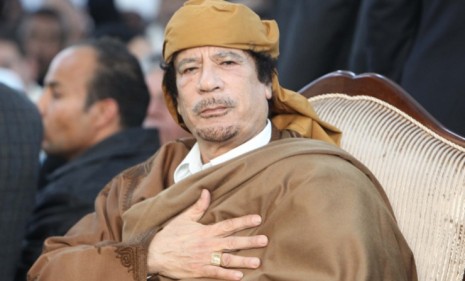Post-Gadhafi Libya: 4 predictions
The Libyan strongman's 41-year reign seems to be nearing its end. Will his exit create a chaotic haven for terrorists — or a more united Libya?

A free daily email with the biggest news stories of the day – and the best features from TheWeek.com
You are now subscribed
Your newsletter sign-up was successful
In his 41 years of near-total control over Libya, Moammar Gadhafi worked hard to ensure that no person or group was in a position to fill his shoes. He outlawed unions, deliberately quashed civil organizations, brutalized any opposition, played tribes off one another, and shuffled the army to prevent any one officer from gaining too much power. Now that Gadhafi's regime appears poised to fall, what will fill the vacuum? Here are four predictions:
1. More chaos will unfold
Nobody expects Gadhafi to give up power voluntarily, says The Economist. "I was the one who created Libya," he reportedly said recently, "and I will be the one to destroy it." Until he is deposed or killed, Libyans are bracing for confusion and upheaval and, even after Gadhafi is gone, "there is little doubt that Libya... will remain a messy and possibly violent place." The North African nation's weak institutions, "tangled laws, and burning animosities" almost guarantee short-term chaos.
The Week
Escape your echo chamber. Get the facts behind the news, plus analysis from multiple perspectives.

Sign up for The Week's Free Newsletters
From our morning news briefing to a weekly Good News Newsletter, get the best of The Week delivered directly to your inbox.
From our morning news briefing to a weekly Good News Newsletter, get the best of The Week delivered directly to your inbox.
2. Tribal leaders will engage in a power struggle
Gadhafi's departure would certainly leave "a major power vacuum," says Alison Pargeter at BBC News. But that doesn't mean there aren't "various players, primarily tribal leaders, seeking to assert themselves, or at least to take control of their own areas." Given the historical enmity among Libya's various tribes, and the large number of weapons circulating among the protesters, "this is unlikely to be a harmonious process."
3. Libya will become an Al Qaeda haven
Gadhafi's accusation that Al Qaeda is behind the uprising, inciting the youth to revolt by feeding them hallucinogenic drugs, may be his "greatest delusion yet," says Paul Cruickshank in CNN. But there really is some danger that "spiraling violence in Libya may provide militant Islamist groups" an opening. That happened in Iraq after the U.S. toppled Saddam Hussein, and "more Libyans per capita traveled to join Al Qaeda in Iraq than any other country." Thanks in part to the Iraq War, a whole generation of Libyans has been "radicalized."
A free daily email with the biggest news stories of the day – and the best features from TheWeek.com
4. A more united Libya will emerge
The "current conventional wisdom" is that Libya will descend into violent chaos after Gadhafi, says Mark Memmott in NPR News. But there's also the chance his departure will leave a "more united Libya." After all, says The Economist, Libya has "plenty of cash" and "talented exiles... eager to return." Plus, the shared trauma of Gadhafi's reign of terror "may have forged a national identity much more heartfelt that it was before.
-
 Political cartoons for February 21
Political cartoons for February 21Cartoons Saturday’s political cartoons include consequences, secrets, and more
-
 Crisis in Cuba: a ‘golden opportunity’ for Washington?
Crisis in Cuba: a ‘golden opportunity’ for Washington?Talking Point The Trump administration is applying the pressure, and with Latin America swinging to the right, Havana is becoming more ‘politically isolated’
-
 5 thoroughly redacted cartoons about Pam Bondi protecting predators
5 thoroughly redacted cartoons about Pam Bondi protecting predatorsCartoons Artists take on the real victim, types of protection, and more